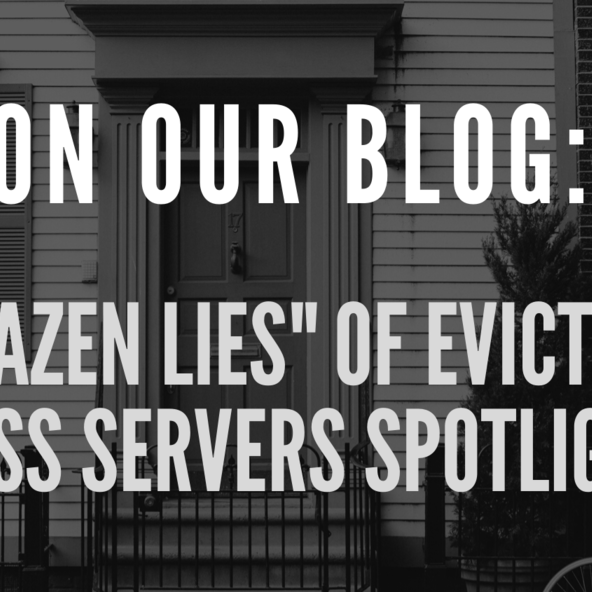
For years, Legal Aid has heard from tenants that they never received notice of a pending eviction case, or that service was improper in some way. But because affidavits filed by process servers are entitled to a legal presumption of accuracy, tenants have found it difficult to convince a judge that an eviction case must be dismissed for improper service. A new, extensive investigation by DCist and SpotlightDC now has exposed just how widespread this problem is, a fundamental injustice at the core of D.C.’s eviction process.
To bring an eviction suit, a landlord must first complete proper service of process, notifying the tenant that there is a case against them, the alleged basis for eviction, and when to attend the first Court hearing. While there is a strong preference for landlords to serve the notice on the tenant in person, D.C. law permits service by posting the notice on the tenant’s door and mailing a copy, as long as in-person service has been attempted twice. D.C. has for many years simply required process servers to sign sworn affidavits that they properly attempted in-person service and then properly posted and mailed notice. These affidavits serve as the sole evidence that service was proper, leaving the Court and tenants completely dependent on the good word of process servers.
The recently published investigation by DCist and SpotlightDC reveals with disturbing and irrefutable detail the frequency of “sewer service,” purposefully inadequate or falsified service, in D.C. eviction cases. Over the course of just two months in 2019, the investigation identified more than 600 cases where process servers’ affidavits contained serious discrepancies or outright lies that a judge would likely consider grounds for dismissal if they were brought to light.
The most troubling findings involved process servers Karl Stephens and Matthew Buck, who operate as Metropolitan Process Services L.L.C. and handle service for more than half of all eviction cases filed in the District. Stephens and Buck claimed to find tenants in person just 0.4 percent of the time, and signed sworn affidavits falsely claiming service in impossible circumstances, such as serving two tenants on opposite sides of the District at the exact same time or within minutes. Karl Stephens even claimed to have served 16 tenants in D.C. over the course of a two-hour period that he actually spent in Maryland, facing his own DWI charge in court.
The brazen lies told by these process servers, who law firms have continued to use despite prior evidence they have been committing fraud, not only are illegal but also can have devastating impacts on the lives of families and individuals facing eviction. Proper notice ensures the tenant’s fundamental right to appear in court and defend themselves. The first hearing in a case is a critical proceeding, where the tenant can request more time to catch up on rent, consult with an attorney, or even make plans to move and avoid eviction. Most tenants who connect with Legal Aid or other legal services providers do so on that first court date. For tenant who miss the initial hearing, the Court immediately enters a default against them, drastically limiting their ability to fight the case and keep their home.
These issues are not new to Steptoe & Johnson partner John O’Connor, who has represented dozens of tenants in eviction cases through the Housing Right to Counsel Project and was the recipient of the Project’s Outstanding Pro Bono Service Award in 2017. As the DCist article details, after becoming interested in the issue of sewer service that he had observed in the cases he handled, John put together his own data set of irregularities in a sample of cases, and then filed a federal lawsuit against Karl Stephens and Metropolitan Process Services and behalf of three tenants who claim Stephens filed false affidavits in their cases. Those cases have since settled with monetary relief to the tenants.
Last Tuesday, just one day after publication of these findings, the D.C. Council voted unanimously in favor of a legislative amendment to prevent sewer service in eviction cases. The new emergency law will require process servers to provide time-stamped photographic evidence for any eviction notice or a complaint served by posting.
Councilmembers Allen, Cheh, and Silverman all indicated their commitment to broader reforms, such as licensing process servers, requiring GPS evidence of service, and asking Attorney General Karl Racine and his office to become more involved in fighting sewer service. Legal Aid looks forward to working with the Council and other advocates on these much-needed changes. The Council also should consider lengthening the minimum time required for service on tenants from 7 days to 21 days before the first Court date. Sewer service is compounded by the fact that tenants often get very little notice of that first hearing, even though the stakes could not be higher.
Legal Aid is grateful for the work of DCist and SpotlightDC in shining light on broken and unfair aspects of the current eviction system in the District. As Councilmember Silverman noted at Tuesday’s legislative meeting, this has been “a problem hiding in plain sight,” and the report highlights “the importance of investigative journalism at the local government level.” At a time when the District is bracing for a coming wave of evictions as a result of the COVID-19 pandemic, we agree with Councilmember Silverman that the Council – as well as the Court and relevant agencies – should take a comprehensive look at the entire eviction process with an eye toward ensuring justice for tenants.




